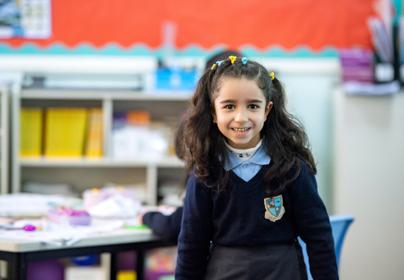At Britannica International School, fostering independence is an integral part of our educational philosophy. We recognise that independence is a vital journey that begins in early childhood, and we actively support the children to help them, help themselves.
Why Independence Matters
Cultivating independence in young children is essential for their development. It helps them build a sense of self, learn life skills, and develop confidence and resilience. When children are encouraged to tackle age-appropriate challenges, they enhance their cognitive abilities and problem-solving skills. Everyday tasks, though sometimes messy or time-consuming, provide invaluable opportunities for growth in this area. Learning problem-solving skills and developing perseverance are crucial for young children, as these abilities equip them to navigate the complexities of an ever-changing world. By fostering these skills in early childhood, we prepare children to face challenges with resilience and creativity, enabling them to adapt and thrive in diverse situations throughout their lives.

How We Can Support Independence
Set Predictable Routines
Establishing consistent daily routines helps children understand what to expect. This predictability empowers them to take on responsibilities such as brushing their teeth or getting dressed. For example, in school the children follow a morning routine. As the children arrive to class, they change into their indoor shoes, hanging up their coats and unpack their bags. Having set routines empowers children to take ownership over their own care and belongings. Structure allows them to navigate their day with confidence.
Offer Choices
Allowing children to make decisions fosters a sense of autonomy. We encourage them to choose between activities or what story they would prefer at story time. This approach not only empowers them but also teaches them to make informed choices while ensuring safety.
Involve Them in Daily Activities
Involving children in chores or cooking tasks is key to building their skills. Activities like pouring milk, sorting laundry, or helping set the table not only make them feel valued but also instill a sense of capability. These tasks also teach important lessons in time management, organisation, and responsibility, laying a solid foundation for functioning independently. At school, children clean up after themselves, spills are cleaned up with a dust pan and brush, and the Home Corner is cleaned up after it has been used.
Encourage Problem-Solving
We believe in allowing children to tackle challenges on their own, whether it's figuring out how to put on shoes or solving a puzzle. Our educators provide guidance only when necessary and focus on praising their efforts rather than the outcomes. Allowing children to figure out how to put on a jacket by themselves or pack their bags so it will close nurtures their critical thinking and perseverance.
Nurture Free Play
Unstructured playtime is crucial for fostering creativity and independence. We provide diverse materials and encourage imaginative play, stepping back to let children explore on their own. This freedom allows them to express themselves and develop problem-solving skills as they navigate their play environments.
Positive Reinforcement
We utilise the “P-R-I-D-E” approach—Praise, Reflect, Imitate, Describe, and Enthusiasm—to recognise and encourage children's efforts and achievements. By celebrating their successes, no matter how small, we reinforce their self-esteem and motivation to continue striving for independence.

By consciously fostering independence in our young learners, we equip them with the skills they need to thrive. Celebrating each small step they take toward becoming capable, confident individuals is fundamental to our mission at Britannica International School. We understand that these foundational experiences not only shape their early years but also set the stage for lifelong learning, personal growth and resilience.
Pre-Nursery has enjoyed being back together this week and has settled beautifully into our daily routines. This week, we celebrated the Lantern Festival by making our own lanterns and trying tangyuan. Following the enthusiasm and joy the children showed for the story of The Gruffalo, we have been reading The Gruffalo’s Child. The children have enjoyed joining in with the story and using descriptive words to talk about the big bad mouse.
It's been lovely to see everyone back in the Nursery after the holidays! All the children have returned with smiling faces, eager to share their holiday adventures with their friends. Everyone has settled back into their daily routines with a new enthusiasm for learning. We've also been exploring a wonderful story called "Dot in the Snow," a beautiful tale that encouraged us to think about making new friends and reminded us of the kindness we can share with others. The children were fascinated and had great fun imagining their own snowy adventures and how they would show kindness to others.
This week in Reception, we immersed ourselves in the enchanting story of the Nian Monster as we prepare for Storytelling Week. The children practiced retelling the tale using storytelling language, which helped them organise their vocabulary and enhance their sequencing skills. They also shared delightful memories from their holidays, writing captions about their favourite memory. Additionally, we began exploring 3D shapes, examining how they appear in our environment and understanding their properties.




